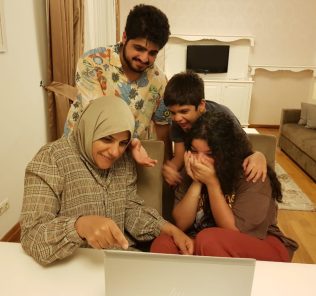Letter from the Editor. Teachers Should be Listened to and Respected. Schools fear UK Government, OFQUAL and Exam Boards plotting A Level and GCSE Exams by the Back Door.
Fears are growing that OFQUAL and the UK government are planning to replace exams with….. well exams, in a sleight of hand that has left schools and students reeling.
As if to prepare schools and teachers for the worst, Simon Lebus, the Interim Head of OFQUAL, made a point of issuing a rambling justification towards the closure of the supposed “”consultation”” on what should replace GCSE and A’ Level exams this year with a thinly veiled justification of mini-examinations, and other statistically uniform testing methods, that would act as the “real” way exam boards would decide the final results students would achieve.
The consultation at the time of closing resulted in more than 90,000 responses from schools, students and parents – and clearly, given his bizarre decision to comment before the consultation had even closed, many of those responding were clearly aghast at the ruinous terms of references they had been given.
In a case of “the lady doth protest too much” Mr Lebus starts by protesting:
“I want to tackle one thing head on – the proposal to have externally-set papers or tasks to help teachers to assess their students objectively. Some have called these ‘mini exams’. This is not what we’ve proposed…”
before then arguing just the opposite:
“These externally-set papers could be provided by exam boards…
An externally-set paper, marked by teachers, could support teachers as they determine the grades their students should receive. […]
The exam boards could also sample teachers’ marking as part of the external quality assurance arrangements and look to see how the school or college is using different sources of evidence. […]
Our consultation also proposes that exam boards use questions in their papers that are similar in style and format to those in normal exam papers. [….]
I hope this explanation goes some way to allay concerns that some students have expressed to us – that these are exams by the back door. They are not. But an externally-set task would help teachers by providing them with an external reference point, giving them greater confidence in the grade they were awarding.”
Consultation update and a proposal for externally-set papers. Simon Lebus. Interim Chief Regulator of OFQUAL
Detractors argue that it is fairly obvious, in practice, that these mini exams that are not exams would be used by OFQUAL to decide grades – with schools and teachers latitude to “make the right decision” crushed.
Plus ça change, plus c’est la même chose.
OFQUAL argues that teachers lack all ability to make sound decisions:
“It would be harder (than was the case in 2020) for a school or college to judge what grade a student would be likely to have received had the exams taken place.”
Consultation on how GCSE, AS and A level grades should be awarded in Summer 2021. UK Department of Education OFQUAL.
Confidence in this supposed consultation has not been helped now that it has emerged that Gavin Williamson, the Education Sector of the British Government, had already set the terms of reference:
“We should seek views in the consultation on what broader evidence should determine a teacher’s assessment of a student’s grade and whether we should require or recommend the use of the externally set tasks or papers,”
Gavin Williamson. Education Secretary. UK Government.
The fear for detractors is that Simon Lebus is simply the poodle of an Education Secretary that has veered from one misstep to another, to put it kindly, or, more bluntly, from one appalling decision to another.
The sleight of hand trade-off being offered to students and schools is that there will be no use of hated algorithms and schools will not have to place students in rank order. But no one is buying this because that could never again be out on the table after last year’s fiasco anyway.
Little wonder that schools, teachers, students and parents are seething that they are being treated as fools.
To add insult to injury, the plan is that schools will have to decide results on each student’s current knowledge – and not what they believe student’s would have achieved had they not been impacted by the pandemic. Essentially the plan is to minimise the ability of school’s to award student results based on their knowledge of what grade each should legitimately been expected to have achieved had they been fairly able to enjoy an uninterrupted education.
Complaints are rife that the consultation was a stitch up with the terms of reference set-up to push schools to agree mini examinations:
“To help teachers make objective decisions we propose that exam boards should provide guidance and training, and make available a set of papers, which teachers use with their students as part of their assessment. This consultation seeks views on whether such papers should be provided and, if so, what form they should take (could they, for example, use materials from previous past papers), when they should be made available, and whether their use should be mandated. We propose that, where it is part of the qualification’s existing specification, teachers will continue to assess any non-exam assessment that a student has undertaken in a subject.”
Consultation on how GCSE, AS and A level grades should be awarded in Summer 2021. UK Department of Education OFQUAL.
The approach is completely at odds with last year:
“We do not believe that teachers should be asked to decide the grade a student might have achieved had the pandemic not occurred.
That would put them in an impossible position, as they would be required to imagine a situation that had not happened.
[…]
We do not propose to ask teachers what grade a student might have received if they had been able to take their exams – which is what teachers were asked in 2020.”
Consultation on how GCSE, AS and A level grades should be awarded in Summer 2021. UK Department of Education OFQUAL.
No teachers or schools we have spoken with accept that the task is anywhere near “impossible.”
What is going on? A set-up? Certainly, once you tie teachers hands behind their backs, and take away their ability to make decisions, what do you end up with? Exams hidden badly behind a veneer of (clearly fake) legitimacy.
So what are students heading for if Williamson et al have their way?
“We propose that teachers should assess their students objectively. To support them we propose the exam boards could provide guidance and training, along with papers which teachers could use to assess their students. The exam boards might work jointly on the guidance and training where appropriate.
Provision of papers by exam boards would support consistency within and between schools and colleges.
The teacher, through the marking of the papers, could consider the evidence of the student’s work and use that to inform their assessment of the grade deserved.
The exam boards could also sample teachers’ marking as part of the external quality assurance arrangements and to seek to ensure this was comparable across different types of school and college, wherever students are studying.
The use of exam board papers could also help with appeals.”
Help who? Not students
And… For could, replace will …..
Will this impact on the International Exam Boards and students in the UAE?
Yes.
The Consultation specifically asks whether the government should ban the international exam boards from proceeding with exams:
“We need to decide whether the exam boards should be prohibited from offering exams in England, in other parts of the UK and elsewhere in the world.
A dual system, whereby some students in other countries took GCSE, AS and A level exams, but students’ grades in England were determined by teacher assessment, might give rise to concerns that there were 2 types of grades awarded – one based on a student’s performance in exams and one based on teacher assessment. “
Given this recognition, it is almost impossible to see jhow the position of Cambridge International and Pearson, who both currently plan on insisting students complete regular examinations, is any way sustainable.
Oxford AQA have already done the right thing and advised schools that traditional examinations will not proceed.
Cambridge and Pearson need now to stop the misery and do the same.
Bottom line?
Why is it that the UK government, OFQUAL and the examination boards are so reluctant to trust schools and teachers?
At least with the examination boards, given the ridiculous hurdles they are piling on schools seeking refunds for examinations that cannot be taken, the obvious answer is that they are driven by revenue rather than the interests of those they serve, or should be serving. They claim that schools and parents want exams – but it increasingly looks like the only place you will actually find these schools and parents begging for exams is in their imagination.
Trying to work out what motivates Gavin Williamson is a fool’s game. No one is convinced that even he knows what he wants. What is widely recognised, as the one certainty in all this, is that he has never shown the least interest in listening to schools, parents and students.
Schools are demanding, rightly, flexibility. They want, as last year, to be given the right to do the right thing for their students.
Geoff Barton, ASCL’s general secretary, said:
“Students have suffered huge disruption because of coronavirus, and they have been affected to widely varying extents.
“That’s why it is vital that the way they are assessed this summer is as flexible as possible in order to ensure that they are tested on content they have covered rather than content they have missed.
“We understand that some people will argue that there should be a set of mandatory assessments because this will provide greater consistency.
“However, there is a danger of replicating the very problems that drove the decision to scrap exams in the first place, namely the fact that students who have suffered the most disruption may find themselves doubly disadvantaged by papers they cannot answer.”
Instead, the ASCL proposes, if these examinations are forced through, that:
“Schools and colleges should be encouraged to ask students to undertake these papers or questions under reasonably controlled conditions if possible, to increase their confidence that they represent a student’s own work.
However, they should not be treated as ‘mini exams’.
There should be no expectation that students come to these tasks unseen, or that all students sit them at the same time.
The use of these papers or questions should be encouraged, rather than mandated. ”
ASCL. January 2021.
All this leaves schools and parents in an utter mess.
International examination boards are at odds with each other.
No one has any trust in an OFQUAL consultation process that seems to have decided the outcome in advance.
Students are not only dealing with Covid 19, but also insecurity, disillusionment and frustration at a system that seems stacked against them.
The lame attempt to protect students and employers from the “evil” of grade inflation has done far worse in leaving the British educational system at the real risk of disrepute, appearing random, run by muppets, mean spirited and very brutally unfair.
And, finally, as usual, it seems the only people that really have anything sensible to say, the ones that know their students best – teachers, are being totally ignored, treated as halfwits and being forced to award results on the basis of rules that will hurt many if not all their students.
The whole sorry story is just another example of students and education being reduced to statistics rather than people. People are not, and have never been, numbers.
Will OFQUAL do the right thing? We shall all know in a few days. But we would not count on it.
© SchoolsCompared.com 2021. The above represent the opinion of the Editor. All rights reserved.
Notes for schools, students and parents:
(1) The original response of Simon Lebus in establishing the consultation can be found here.
(2) The post by Simon Lebus before the consultation had closed can be found in full here.
(3) Our view on examinations can be found here.





































































Leave a Response